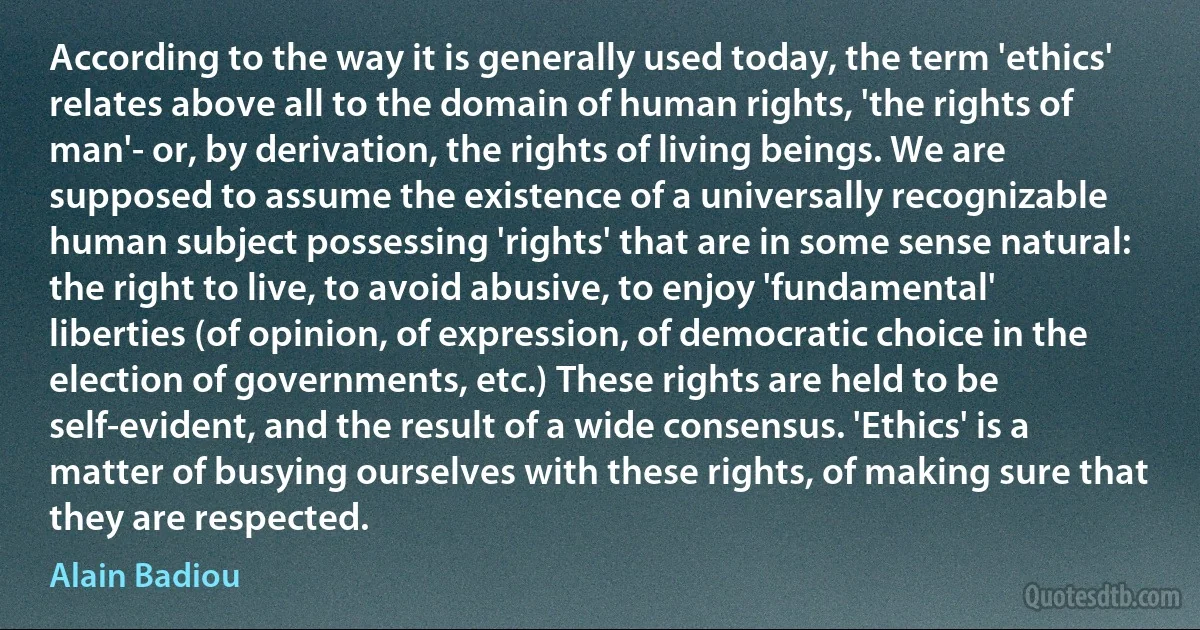
According to the way it is generally used today, the term 'ethics' relates above all to the domain of human rights, 'the rights of man'- or, by derivation, the rights of living beings. We are supposed to assume the existence of a universally recognizable human subject possessing 'rights' that are in some sense natural: the right to live, to avoid abusive, to enjoy 'fundamental' liberties (of opinion, of expression, of democratic choice in the election of governments, etc.) These rights are held to be self-evident, and the result of a wide consensus. 'Ethics' is a matter of busying ourselves with these rights, of making sure that they are respected.
Alain BadiouRelated topics
above choice consensus democratic derivation ethics fundamental hold human living live making man matter natural opinion result right sense sure way wide etc todayRelated quotes
The great masses, who have never been, in the history of mankind, more subject to hypnotic suggestion than they are right now, have become the puppets of the "public opinion” that is engineered by the newspapers in the service, it need hardly be emphasized, of the reigning powers of finance. What is printed in the morning editions of the big city newspapers is the opinion of nine out of ten readers by nightfall. The United States of America, whose more rapid "progress” enables us to predict the future on a daily basis, has pulled far ahead of the pack when it comes to standardizing thought, work, entertainment, etc.

Ludwig Klages
In short, the opinion of Aristotle is this: Everything is the result of management which is constant, which does not come to an end and does not change any of its properties, as e. g., the heavenly beings, and everything which continues according to a certain rule... But that which is not constant, and does not follow a certain rule... is due to chance and not to management; it is in no relation to Divine Providence. Aristotle holds that it is even impossible to ascribe to Providence that management of these things. ...It is the belief of those who turned away from our Law and said: "God hath forsaken the earth."

Maimonides
According to the dictionary, to administer is to govern, or to manage a public or private business. It means, therefore, to seek to make the best possible use of the resources available in achieving the goal of the enterprise. Administration includes, therefore, all the operations of the enterprise. But as a result of the usual way of organizing things to facilitate the running of the business, a certain number of activities constitute the special departments; the technical department, the commercial department, the financial department, etc., and the scope of the administrative department is found to be reduced accordingly.

Henri Fayol
Modern empiricism has been conditioned in large part by two dogmas. One is a belief in some fundamental cleavage between truths which are analytic, or grounded in meanings independently of matters of fact, and truths which are synthetic, or grounded in fact. The other dogma is reductionism: the belief that each meaningful statement is equivalent to some logical construct upon terms which refer to immediate experience. Both dogmas, I shall argue, are ill-founded. One effect of abandoning them is, as we shall see, a blurring of the supposed boundary between speculative metaphysics and natural science. Another effect is a shift toward pragmatism.

Willard van Orman Quine
In 1980s the African National Congress was still setting the pace, being the first major political formation in South Africa to commit itself firmly to a Bill of Rights, which we published in November 1990. These milestones give concrete expression to what South Africa can become. They speak of a constitutional, democratic, political order in which, regardless of colour, gender, religion, political opinion or sexual orientation, the law will provide for the equal protection of all citizens.
They project a democracy in which the government, whomever that government may be, will be bound by a higher set of rules, embodied in a constitution, and will not be able govern the country as it pleases.

Nelson Mandela
